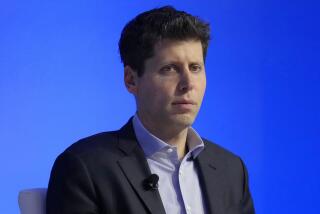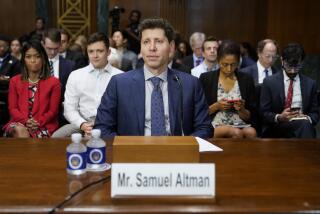CEO of Vivendi Gains Layer of Oversight as Debt Mounts
- Share via
After an eight-hour meeting Wednesday with his frustrated bosses, Vivendi Universal Chief Executive Jean-Marie Messier emerged with a new layer of oversight, by a committee led by one of the conglomerate’s most powerful shareholders, and a mandate to slash the corporation’s mounting debt.
The corporate governance committee created by Vivendi’s board of directors will be co-chaired by Edgar Bronfman Jr., vice chairman of the Vivendi board. The Bronfman family owns 5.3% of Vivendi and has been unhappy about a significant falloff in its holdings as Vivendi’s stock has dropped 45% this year amid investor concerns over the company’s strategy and high debt load.
Bronfman’s heightened role comes only six months after he cut his day-to-day ties to Vivendi Universal. Bronfman headed Universal when it was owned by his family’s Seagram Co., which sold the studio to Vivendi 18 months ago.
Assisting Bronfman will be Marc Vienot, former chief executive of Societe Generale, who had expressed support for Messier at the company’s tumultuous shareholder meeting last month in Paris.
Vivendi said in a statement after Wednesday’s marathon meeting in New York that it was Messier’s idea to create the committee, which the company said would address “the best international practices” in corporate governance, but declined to discuss specifics. A source close to the board said one of the committee’s key tasks would be to monitor Messier’s management of the company as it attempts to regain investor confidence.
Neither Messier, Bronfman nor Vienot could be reached for comment.
Since moving from Paris to New York last year, Messier has faced a barrage of setbacks in his homeland and in the U.S. He recently inflamed the French establishment with the firing of a popular French television executive.
Some French board members also have been frustrated by Messier’s flamboyant style, his tendency to reverse previously announced decisions and his growth-by-acquisition strategy.
In the U.S., he has failed to win over investors, who are skeptical about his multimedia vision of using cell phones and the Internet as pipelines for movies, music and games.
Investors, moreover, are confused by a company that has one foot in the entertainment world and the other in the water distribution and sewage treatment business.
Last year, the company posted a $12.6-billion loss--the biggest in French corporate history--because of a sharp decline in the value of its Canal Plus and Seagram acquisitions.
The 16-member board includes some of France’s most influential businessmen, including Jean-Louis Beffa, chairman of Saint-Gobain; Bernard Arnault, CEO of luxury goods maker LVMH Moet Hennessy Louis Vuitton; and Serge Tchuruk, CEO of phone firm Alcatel.
Some board members publicly rallied behind Messier amid speculation that he was losing his grip on the company he has run since 1996.
“I wish Jean-Marie Messier plenty of success and assure him of my backing,” Henri Lachmann, CEO of Schneider and a Vivendi board member told Europe 1 radio Wednesday. “My backing sometimes comes with some criticism, but never publicly.”
Support also came from Le Figaro, France’s largest conservative newspaper. Editor Yves de Chaisemartin praised Messier for taking risks in an article titled “We must save Private Messier.”
Barry Diller, who heads the U.S. entertainment division of Vivendi but is not a board member, told reporters gathered outside Vivendi’s New York offices, “I am a supporter of Messier.” When asked whether he might replace Messier, he said, “You must be joking.”
The rumors surrounding Messier come as Vivendi’s debt ballooned to $30 billion in the last two years as the former investment banker orchestrated a series of high-profile acquisitions aimed at transforming a 149-year-old water utility into a rival of AOL Time Warner Inc.
At Wednesday’s meeting, Messier presented a plan to reduce the company’s debt through the sale of peripheral businesses, including reducing the company’s stake in its utility business from 63% to below 50%.
Such a move would allow Vivendi to raise $1.7 billion in cash from the proposed utility sale, which would also remove $14 billion of the unit’s debt from the company’s balance sheet.
Vivendi’s board said it supported the debt-reduction program but declined to discuss specific candidates for sale.
Vivendi also said the board “carried out a detailed examination” of the company’s financial targets and wants management to “concentrate on implementing this strategy.”
The company could raise about $5.8 billion from the sale of non-core assets, including the utility investment, wrote Gregory Deschamps, an analyst with Oddo Pinatton, in a note to investors.
That includes $900 million from the sale of Telepiu, its money-losing pay television unit; $460 million from Numericable, a French cable operator; and $325 million from Canal Plus Technologies, a pay-TV software provider.
As expected, the board also decided not to schedule another shareholder meeting. After its annual shareholder meeting in April, Vivendi discovered that the electronic voting system had been tampered with, affecting results for two key resolutions: one that would have allowed the company to raise $2.7 billion by issuing new shares, and one that would have allocated 5% of Vivendi’s shares for stock options for senior executives.
Although Vivendi had court approval to put the resolutions to another vote, the company reconsidered because of the expense of holding another meeting and a reluctance to give Messier’s critics another platform, said sources close to the board.
Vivendi’s American depositary receipts rose 5 cents to $31.57 on the New York Stock Exchange.
More to Read
Inside the business of entertainment
The Wide Shot brings you news, analysis and insights on everything from streaming wars to production — and what it all means for the future.
You may occasionally receive promotional content from the Los Angeles Times.











